(完整word版)高中英语名词讲解及练习
(完整版)名词性从句讲解及专项练习习题及其解答
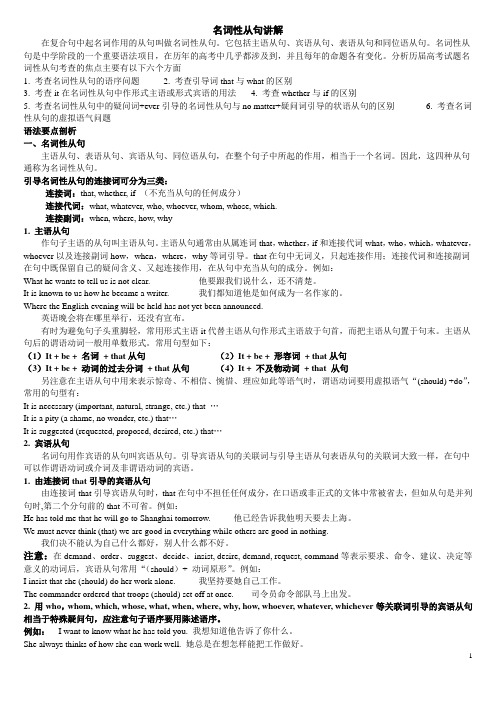
名词性从句讲解在复合句中起名词作用的从句叫做名词性从句。
它包括主语从句、宾语从句、表语从句和同位语从句。
名词性从句是中学阶段的一个重要语法项目,在历年的高考中几乎都涉及到,并且每年的命题各有变化。
分析历届高考试题名词性从句考查的焦点主要有以下六个方面1. 考查名词性从句的语序问题2. 考查引导词that与what的区别3. 考查it在名词性从句中作形式主语或形式宾语的用法4. 考查whether与if的区别5. 考查名词性从句中的疑问词+ever引导的名词性从句与no matter+疑问词引导的状语从句的区别6. 考查名词性从句的虚拟语气问题语法要点剖析一、名词性从句主语从句、表语从句、宾语从句、同位语从句,在整个句子中所起的作用,相当于一个名词。
因此,这四种从句通称为名词性从句。
引导名词性从句的连接词可分为三类:连接词:that, whether, if (不充当从句的任何成分)连接代词:what, whatever, who, whoever, whom, whose, which.连接副词:when, where, how, why1. 主语从句作句子主语的从句叫主语从句。
主语从句通常由从属连词that,whether,if和连接代词what,who,which,whatever,whoever以及连接副词how,when,where,why等词引导。
that在句中无词义,只起连接作用;连接代词和连接副词在句中既保留自己的疑问含义、又起连接作用,在从句中充当从句的成分。
例如:What he wants to tell us is not clear. 他要跟我们说什么,还不清楚。
It is known to us how he became a writer. 我们都知道他是如何成为一名作家的。
Where the English evening will be held has not yet been announced.英语晚会将在哪里举行,还没有宣布。
高中英语语法知识单项选择题专练 名词(word版含解析)

高中英语语法知识单项选择题专练名词1. The commander said that two________ would be sent to the Iraqi front the next day.A. women’s doctorB. women doctorsC. women’s doctorsD. women doctor2. “Look! The police ________ here to keep order! Go away quickly,” o ne of them shouted.A. is comingB. comesC. are comingD. has come3. She could not speak English, but made her wishes known by means of _____.A. signsB. sighsC. movementsD. words4. In my opinion, what he told us just now about the affair simply doesn’t make any _____.A. ideaB. meaningC. senseD. point5. Shelly had prepared carefully for her English examination so that she could be sure of passing it on her first _____.A. intentionB. attemptC. purposeD. desire6. ________ food is kept in his new cave, but at last Saddam was still arrested.A. Large quantities ofB. A great deal ofC. A large number ofD. Quite a few7. ––Let’s try operating the machine right now.––Wait. Better read the _____first.A. instructionsB. explanationsC. informationD. introduction8.The rest of the magazines________ within half an hour.A. is sold outB. was sold outC. were sold outD. are sold out9. You’d have more _____of catching the train if you took a bus to the station instead of walking.A. opportunityB. chanceC. timeD. energy10.The number of deer, mountain lions and wild roses________ much if people leave things________ they are.A. doesn’t change; asB. aren’t changed; likeC. don’t change; likeD. d on’t change; as11. I knew I shouldn’t accept anything from such a person, but I found it difficult to turn down his _____.A. offerB. suggestionC. requestD. plan12.________it is to gather with President Bush at such a special Thanksgiving Day in Iraq!A. what a funB. what funC. how funD. what joy13. Oh., John________ you gave us!A. How a great surpriseB. how pleasant surpriseC. what a pleasant surpriseD. what pleasant surprise14 He is________ as a leader but he hasn’t________ in teaching.A. success; many experiencesB. a success; much experienceC. great success; an experienceD. a great success; a lot of experiences15 —Who did you spend last weekend with?—________.A. Palmer’sB. The Palmers’C. The PalmersD. The Palmer’s16. Ten years had passed. I found she had _______.A. a few white hairsB. a little white hairC. some white hairD. more fifty hair17.—Hi, this way, please.—OK.I sometimes have no sense of ______ when I arrive at the crossroad.A. positionB. directionC. situationD. condition18. Shelly had prepared carefully for her English examination so that she could be sure of passing it on her first ________.A. intentionB. attemptC. purposeD. desire19. I didn’t have to work all weekend — I did it by _______.A. chanceB. choiceC. accidentD. myself20. “Did you get _____ to the party?” “Yes, I replied to it this morning.”A. an answerB. an invitationC. a questionD. a letter21. I paid him £50 for the painting, but its true ______ must be at least £500.A. priceB. moneyC. valueD. importance22. His letter was so confusing that I could hardly make any ______ of it.A. explanationB. meaningC. senseD. guess23. You’ve just missed your ______, and you will have to wait for the next round.A. chanceB. turnC. timeD. part24. —Li Lin is very bright and studies hard as well.—It’s no ______ he always gets the first place in any examination.A. questionB. doubtC. problemD. wonder25. —How can I use this washing machine?—Well, just refer to the _______.A. explanationsB. expressionsC. introductionsD. directions26. Jim was late for two classes this morning. He said that he forgot both of the ______.A. rooms numberB. room numberC. room’s numbersD. room numbers27. —Hello, I’d like to speak to Henry.—Oh, which _______? There are two ______ in our office.A. Henrys, HenrysB. Henries, HenriesC. Henry, HenrysD. Henrys, Henries28. Electricity, like other forms of ______, has greatly increased in price in recent years.A. pressureB. forceC. strengthD. energy29. In order to learn the _______ of the family business, Bill took a job as messengerboy in one of the offices.A. ins and outsB. dos and don’tsC. heads and tailsD. t’s and i’s30. —I’ve got an “A” in the examination.—That’s a good ______. You will surely win a second.A. resultB. newsC. startD. idea【模拟解析】1. B。
高中名词性从句全面讲解及练习含答案

高中英语讲义---- 名词性从句(主从、表从、宾从,同从)1,陈述句做名从用连词that + SV, that 表主句确定从句完好,不做成分。
主从可用it 做形式主语,宾从第一个that 可省略。
You study hard.主从:That you study hard is known to us.= It is known to us that you study hard.表从:My opinion is that you study hard .宾从:I think (that) you study hard. …and that (不能省略)….同从:My opinion that you study hard is known to us. *比拟同从和主从!●一般抽象名词后对其进展说明和说明的完好句子就是其同位语从句,不完好就是定语从句。
I appreciate your idea that we have an exam every week. (that后完好—同从)I appreciate your idea that you came up with last time.(that后不完好---定从)2,一般问句做名从用连词whether(是否) + SV,whether表主句不愿定从句完好,宾从中可用if(介词后或宾从后有or not时只用whether)。
Does your friend like English ?主从:Whether your friend likes English isn’t clear .=It isn’t clear whether your friend likes English.表从:My question is whether your friend likes English.宾从:I don’t know whether/ if your friend likes English.同从:My question whether your friend likes English isn’t clear.3, 特殊问句做名从用疑问词(连词)+ SV, 疑问词做主语时干脆+谓语。
(完整word版)高中英语名词性从句讲解
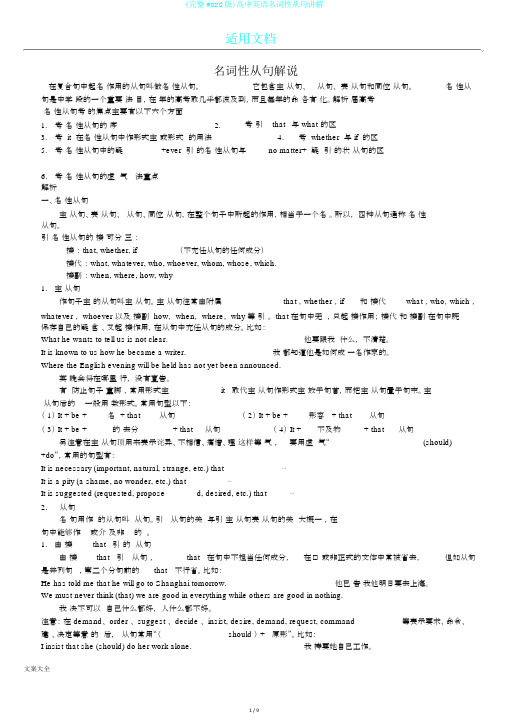
适用文档名词性从句解说在复合句中起名作用的从句叫做名性从句。
它包含主从句、从句、表从句和同位从句。
名性从句是中学段的一个重要法目,在年的高考取几乎都波及到,而且每年的命各有化。
解析届高考名性从句考的焦点主要有以下六个方面1. 考名性从句的序2. 考引 that 与 what 的区3. 考 it 在名性从句中作形式主或形式的用法4. 考 whether 与 if 的区5. 考名性从句中的疑+ever 引的名性从句与no matter+ 疑引的状从句的区6.考名性从句的虚气法重点解析一、名性从句主从句、表从句、从句、同位从句,在整个句子中所起的作用,相当于一个名。
所以,四种从句通称名性从句。
引名性从句的接可分三:接: that, whether, if(不充任从句的任何成分)接代: what, whatever, who, whoever, whom, whose, which.接副: when, where, how, why1.主从句作句子主的从句叫主从句。
主从句往常由附属that ,whether ,if和接代what ,who,which ,whatever , whoever 以及接副 how, when, where, why 等引。
that 在句中无,只起接作用;接代和接副在句中既保存自己的疑含、又起接作用,在从句中充任从句的成分。
比如:What he wants to tell us is not clear.他要跟我什么,不清楚。
It is known to us how he became a writer.我都知道他是如何成一名作家的。
Where the English evening will be held has not yet been announced.英晚会将在哪里行,没有宣告。
有防止句子重脚,常用形式主it取代主从句作形式主放于句首,而把主从句置于句末。
主从句后的一般用数形式。
(完整word版)高中英语名词的练习题
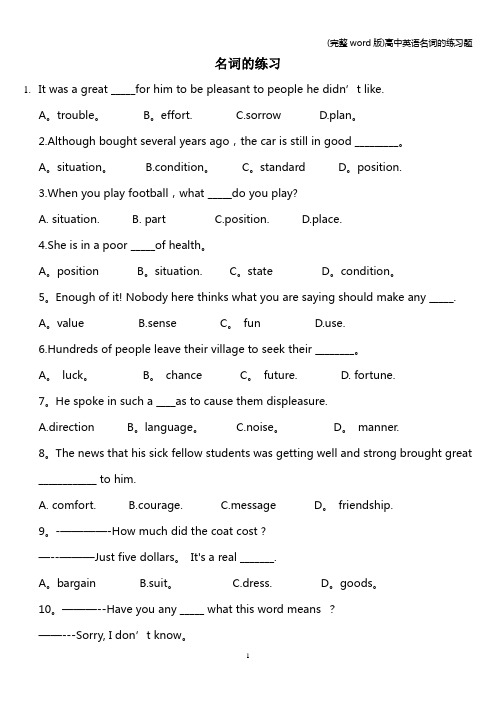
名词的练习1.It was a great _____for him to be pleasant to people he didn’t like.A。
trouble。
B。
effort. C.sorrow D.plan。
2.Although bought several years ago,the car is still in good _________。
A。
situation。
B.condition。
C。
standard D。
position.3.When you play football,what _____do you play?A. situation.B. partC.position.D.place.4.She is in a poor _____of health。
A。
position B。
situation. C。
state D。
condition。
5。
Enough of it! Nobody here thinks what you are saying should make any _____.A。
value B.sense C。
fun e.6.Hundreds of people leave their village to seek their ________。
A。
luck。
B。
chance C。
future. D. fortune.7。
He spoke in such a ____as to cause them displeasure.A.direction B。
language。
C.noise。
D。
manner.8。
The news that his sick fellow students was getting well and strong brought great ____________ to him.A. comfort.B.courage.C.message D。
(完整版)高中英语名词性从句详解
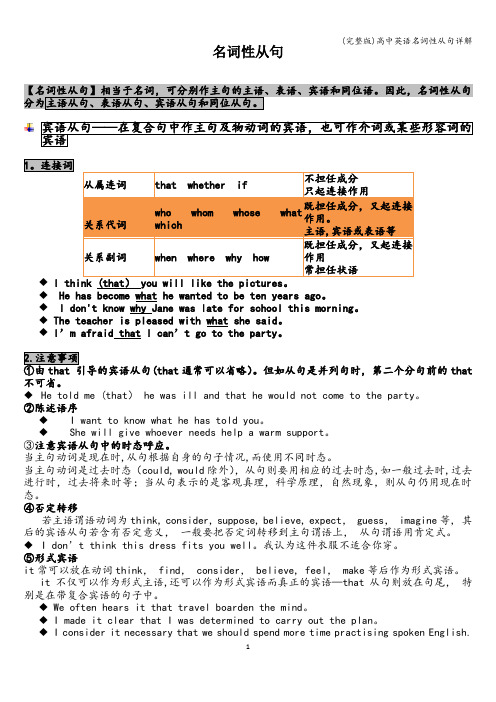
(完整版)高中英语名词性从句详解名词性从句【名词性从句】相当于名词,可分别作主句的主语、表语、宾语和同位语。
因此,名词性从句分为主语从句、表语从句、宾语从句和同位从句。
宾语从句——在复合句中作主句及物动词的宾语,也可作介词或某些形容词的宾语1。
连接词从属连词that whether if 不担任成分只起连接作用关系代词who whom whose whatwhich既担任成分,又起连接作用。
主语,宾语或表语等关系副词when where why how 既担任成分,又起连接作用常担任状语◆I think (that) you will like the pictures。
◆ He has become what he wanted to be ten years ago。
◆ I don't know why Jane was late for school this morning。
◆The teacher is pleased with what she said。
◆I’m afraid that I can’t go to the party。
2.注意事项(that通常可以省略)。
但如从句是并列句时,第二个分句前的that 不可省。
◆He told me (that) he was ill and that he would not come to the party。
②陈述语序◆ I want to know what he has told you。
◆ She will give whoever needs help a warm support。
③注意宾语从句中的时态呼应。
当主句动词是现在时,从句根据自身的句子情况,而使用不同时态。
当主句动词是过去时态(could, would除外),从句则要用相应的过去时态,如一般过去时,过去进行时,过去将来时等;当从句表示的是客观真理,科学原理,自然现象,则从句仍用现在时态。
名词性从句详细讲解及练习题

名词性从句详细讲解及练习题高中英语从句大全一.名词性从句起名词性作用的从句叫名词性从句英语当中其名词性作用的成分有主语,宾语,表语,同位语,当这些成分有一个句子来代替就构成了名词从句,主要有主语从句,宾语从句,表语从句,同位语从句。
1.表语从句1.定义:用作表语的从句叫做表语从句。
(be动词,四“变得”:become, get,turn,go;感官动词look,, smell,sound,taste,feel;及grow, turn out,appear,keep等)引导表语从句的词有从属连词that、whether、as though(if);关系代词who, what, which, whom, whose, whatever, whoever, whomever, whichever 等;关系副词when, where, why, how, however, whenever, wherever等。
可以接表语从句的连系动词由be, look, remain, seem等。
The trouble is that we are short of money.That is why stone walls are used instead of fences around New England fields.At that time, it seemed as if I couldn't think of the right word anyhow2、由从属连词that,whether引导的表语从句。
that在引导表语从句时无词义,在口语中,间或可以省略。
而whether有词义,意为、“是否”。
这时主句的主语常常是些抽象名词,如question,trouble,problem等。
表语从句对主句主语进行说明、解释,使主语的内容具体化。
The trouble is that I have lost his addressThe question is whether they will be able to help us.问题是他们是否能帮我们。
(word完整版)名词所有格带答案
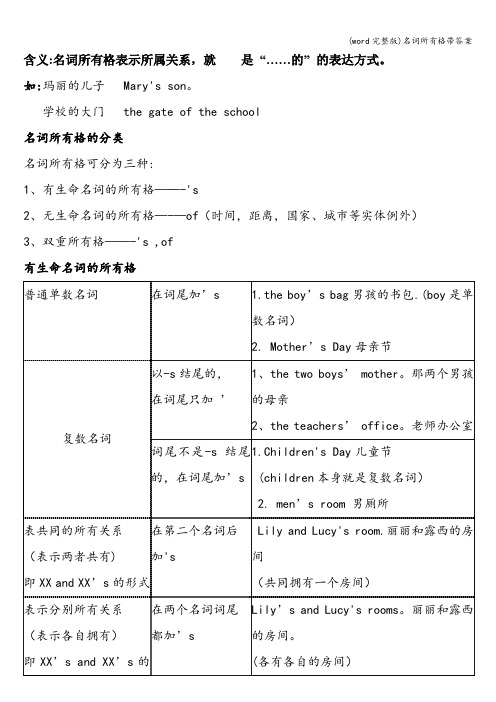
如:玛丽的儿子 Mary'sson。
学校的大门 the gate of the school
名词所有格的分类
名词所有格可分为三种:
1、有生命名词的所有格——-'s
2、无生命名词的所有格—-—of(时间,距离,国家、城市等实体例外)
3、双重所有格——-'s ,of
练习二
1.This isLilei’s family。(李雷的家庭).
2.Is thata photo of Bill’s family?(比尔家的一幅照片)?
3.What’sthe name of Tom’s sister(汤姆妹妹的名字)?
4.This isLily and Lucy’s(莉莉和露茜的)room.
5.They areMrs。 Green’s sons(格林夫人的儿子).
6.It’s mymother’s bag(mother)bag.
7.Are these thetwin's(twin)books﹖
8.March 8(三月八日)iswomen’s(woman)Day.
9.What’s the girl’s name﹖(同义句)
(C) 5。 ________ cell phone number is 13836798452.
A.MaryB。 Mary isC。 Mary’s
1。 March 8th isWomen’s Day。(妇女节)
2. The children are wearing new clotheson Children’s Day。(儿童节那天)
c、表国家、城市等实体:China’s future (中国的未来)
- 1、下载文档前请自行甄别文档内容的完整性,平台不提供额外的编辑、内容补充、找答案等附加服务。
- 2、"仅部分预览"的文档,不可在线预览部分如存在完整性等问题,可反馈申请退款(可完整预览的文档不适用该条件!)。
- 3、如文档侵犯您的权益,请联系客服反馈,我们会尽快为您处理(人工客服工作时间:9:00-18:30)。
名词一、名词的分类专有名词主要是指人名、地名或某类人或事物的名称,如Beijing,China等。
普通名词是一类人或东西或是一个抽象概念的名词,如:book,sadness等。
专有名词抽象名词不可数名词物质名词普通名词集体名词个体名词可数名词个体名词和集体名词可以用数目来计算,称为可数名词(Countable Nouns),物质名词和抽象名词一般无法用数目计算,称为不可数名词(Uncountable Nouns)。
Proper Nouns:指人名、地名及某些人和事物专有的名称Eg: Diana; Beijing; Americans; English; May; New Year’s Day注意:专有名词的第一个字母要大写Common Nouns:一类人或东西或是一个抽象概念的名词1. Individual Nouns: 指作为个体而存在的人或东西可以指具体的人或物。
Eg: aunts; a panda; apartments也可指抽象东西。
Eg: a year; fairy tales; a dream2. Collective Nouns: 表示若干个个体组成的集合体Eg: army; audience; crew; family; team; police; government; public集体名词有时作单数看待,有时作复数看。
一般来说,视为整体时作单数看,突出它的成员时作复数看。
His family _____ not large.His family ______ all music lovers.有少数集体名词通常用作单数。
Eg: The gang is being hunted by the police.Our company is sending him to work in Berlin.个别集体名词则多作复数看待。
Eg: The police are looking for him.3. Material Nouns: 指无法分为个体的物质。
Eg: beer; cake; cloth; cotton; detergent; fur; ice; paint; paper; soil一般来说,物质名词是不可数的,因而没有复数形式。
但有一些特殊情况:1) 有些物质名词可用作可数名词,表示“一份”、“一杯”、“一种”Eg: Two strong black coffees, please. ( 两份)Three beers, please. (三杯) It was a special tea. (一种)2)个别物质名词的复数形式可以表示特别的意义。
Eg: rains (雨季)sands (沙滩)snows (积雪) waters(海域)…4.Abstract Nouns:表示动作、状态、品质、感情等抽象概念Eg: education; love; policy; trust; nature; fashion; relief; silence; truth,etc.多数情况下,这种名词常用于单数形式,不加任何冠词。
Eg: He’s learning French for fun.I wish you good luck.抽象名词转化为可数名词。
Failure is the mother of success. (失败与成功在此为抽象概念)As a teacher , she is a success, but as a mother, she is a failure because she devotes little time to looking after her child. (成功者,失败者,可数)二、名词的数不可数名词一般没有单复数之分,它包括抽象名词、物质名词和专有名词。
例如:health, advice, glass, wood, English, America不可数名词作主语,谓语动词须用单数形式。
Notes:1. stomach -- stomachs2. 以元音+y或以专有名词+y结尾的名词,直接在词尾加-s. Eg: boys; toys; Henrys3. 以-o 结尾的名词+ es在课本中出现的有hero, potato, tomato;其余以-o结尾的词+ s: (photo, piano, radio, bamboo ,zoo…)4:以f/fe结尾只加-s的词:proofs; gulfs; cliffs; roofs; serfs; beliefs; chiefshandkerchief(手帕,手绢)的复数形式两者都可以。
不规则变化:变内部元音:foot-feet, tooth-teeth, goose-geese ,mouse-mice, man-men, woman-women, policeman-policemen词尾加-en或ren:ox-oxen, child-childrenouse – ice:mouse-mice; louse-lice(虱子)有些外来词的不规则复数形式:Eg: analys i s-analys e s; bas i s-bas e s; thes i s-thes e s;cris i s-cris e scriteri on-criteri a; phenomen on-phenomen a; medi um-medi a单复数相同的情况:sheep; deer; means; fish; works; species; Chinese; Japanese以及由汉语音译表示度量衡、货币等单位的名词。
Eg: yuan, jiao, fen, jin, mu只有复数形式的情况:trousers(裤子); glasses(眼镜); compasses(圆规) a pair of thanks; clothes; remains; goods; people; cattle“某国人”的复数形式:•单、复数相同Chinese, Japanese, Swiss,…•词尾加-s Africans, Asians, Canadians, Australians, Italians,……•变man为men Englishman---Englishmen, Frenchman---Frenchmen但:German---Germans复合名词的复数形式:1.一般将主体名词变为复数。
father-in-law →fathers-in-law, passer-by →passers-by,looker-on→lookers-on, editor-in-chief →editors-in-chief2.无主体名词的在词尾加复数。
如:grown-ups, good-for-nothings(无用的人),go-betweens (中间人),look-outs(守望者)3.由man, woman,构成的复合名词应将前后两个词都变成复数。
men-doctors, women-drivers, women-singers•boyfriends, girlfriends, boy students, girl students有些名词可以兼作可数名词和不可数名词。
beauty(美,美貌)---a beauty(一个美人/物)danger(危险)—a danger(一件危险的事/人)failure(失败)—a failure(一件失败的事/人)honour(光荣)—an honour(带来荣誉的/或事)pity(遗憾)—a pity(一件可惜的事)success(成功)—a success(一件成功的事/人)surprise(惊奇)—a surprise(一件令人吃惊的事)pleasure(乐趣)—a pleasure(一件有趣的事)worry(担心)—a worry(一件令人担心的事)experience(经验)—an experience(一次经历)service(服务)—a service(一个服务机构)英语中有许多对词,一个可数,一个不可数。
a poem(一首诗) poetry(诗歌总称)a machine(一台机器) machinery(机器总称)a job(一件工作) work(工作)a laugh(一个笑声) laughter(笑声)a permit(许可证) permission(允许)a garment (一件衣裳) clothing(衣裳总称)a bag(case) (一件行李) luggage, baggage(行李)a loaf (一只面包) bread(面包)a hair(一根头发) hair(头发)几个名词的特殊用法1. hairHis hair is white.(他的头发是白的。
)He has a few grey hairs.(他有几根白的头发。
)2. fruitThe fruit is sweet.He likes pears, peaches, grapes and other fruits.3. policeThe police are searching for the murderer.dozen, scoretwo (many, several) dozen pencils three dozen of them / these pencilsdozens of students two score of students scores of peopleword(消息,通知), man(人类),前面不加冠词,也不用复数形式,谓语用单数。
三、名词的格英语中的名词(代词)有三个格:主格、宾格、所有格。
所有格表示所有关系,修饰另一名词,作定语,它有两种形式:一种是由名词词尾加’s构成,另一种是由介词of加名词构成,前者多用来表示有生命的东西,后者多用来表示无生命的东西。
所有格的形式:1. 一般的名词所有格在后面加’s:Mary’s book2. 以–s 结尾的复数名词所有格在后面仅加’:Teachers’ Day, the students’ reading-room3. 以–s 结尾的专有名词所有格:Engels’s works 或Engels’ works4. 复合名词的所有格是在其词尾加’s:his mother-in-law’s photothe editor-in-chief’s opinion5. 如果一样东西为两人共有,则只在最后一个名词后加’s,如果是分别所有,则两个名词后都要加’s:Tom and Marry’s father, Tom’s and Marry’s fathers6. 在表示“某人家”、“店铺”的所有格时,一般省略它所修饰的名词:at the doctor’s,at the barber’s, at Mr. Green’s, at the tailor’s7. 有些表示时间、距离、国家、城市、团体、机构等无生命东西的名词,也可以加’s来构成所有格:today’s newspaper ten minutes’ walk China’s industry the station’s waiting-room the earth's surface a dollar's worth8. 凡不能加’s 构成所有格的名词,都可以与of 结成短语,来表示所有格关系。
